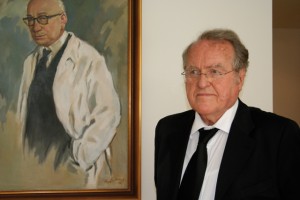by Eberhard Deisenhammer
 Franz Gerstenbrand was born in south Moravia as a son of a general practitioner. He visited regular schools in nearby Nikolsburg. He had to participate in the German Army. After World War II he started studying medicine at the University of Vienna. In 1950 he was accepted for training in neurology.
Franz Gerstenbrand was born in south Moravia as a son of a general practitioner. He visited regular schools in nearby Nikolsburg. He had to participate in the German Army. After World War II he started studying medicine at the University of Vienna. In 1950 he was accepted for training in neurology.
His main teacher was Professor Hans Hoff who at this time had come back from the United States to which he had to emigrate and was very welcome by the members of the medical faculty.
Austria as well as Germany was cut off from most medical scientific development during the war and even some years before and Hans Hoff brought with him much of new neurological knowledge. Hoff had a strong social, political and scientific network and was able to implement many new neurological and psychiatric developments into the neuro-psychiatric university clinic such as neuroradiology, neuronuclear medicine, stroke care, child neurology, etc., as well as psychiatric subspecialties.
Gerstenbrand was a keen pupil and continued himself in these activities when he reached other positions, especially as the head of the Neurological University Clinic in Innsbruck. He took care of the implementation of a stroke unit long before these units were obligatory for most neurological departments in Austria or abroad, a neurological CT department, a highly specified chemical laboratory, a neurological intensive care department, and many others.
Just an example: As assistant at the Vienna Neurological Clinic, he had already established a department for brain injured patients and later on he took especially care of these patients. One of his last academic activities referred to space neurology.
The number of the staff, especially neurologists increased significantly. And the scientific efficiency allowed his co-workers to gain great financial support, so called Drittmittel- income to further increase the activities of the neurological clinic.
Gerstenbrand took over the networks of Hans Hoff and had strong ties to politicians responsible for medicine and soon most of these politicians knew that the brain was the most important organ of the body. Therefore neurology is the most important branch in medicine.
He inspired some colleagues from outside his department in Innsbruck to accompany him on the way to politicians and institutions to finally broaden the neurological field in all the various respects. During this time many new neurological departments in Austria were founded.
Due to his heritance he had strong affiliations to neurologists in the post-war communist Eastern states and tried to help them as much as possible to keep scientific contact to the West. He enabled them to visit the West via the newly founded Donausymposium (Danube Symposium) which took place altering every year in a Western or Eastern European country and he is still keeping many strong and hearty friendships over the borders.
The foundation of the EFNS resulted from the same ideas and the total history; how finally the EFNS developed can be read in the archives of the EFNS (Chapter History – http://archive.efns.org/history.php).
All this and Professor Franz Gerstenbrand’s reputation had an important effect on the scientific activities at the Neurological University in Innsbruck and his co-workers could form a new scientific basis.
Finally, he was honoured not only in Innsbruck, Austria and throughout Europe, but all over the world.
Franz Gerstenbrand will be honoured by a Life Time Achievement Award during the upcoming World Congress of Neurology in Vienna in September 2013. The award will be handed over to Professor Gerstenbrand on Monday, 23 September (9.00h, Hall A), at the Presidential Session at the Congress venue.
We look forward to this special event!



